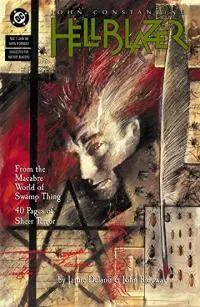When a veteran cop investigates the case of a missing girl, he finds himself tangled in a web of strange occurrences and suspects that a demonic presence may be responsible for her disappearance. While it’s not the most original plot you’ve ever heard, it’s one that can be extremely popular when done well. Modern readers and audiences love stories where law enforcement officers try to solve crimes with supernatural elements. From True Detective to the X-Files to the Dresden Files, we are accustomed to seeing horror, crime and even fantasy genres cross over when dealing with the occult detective trope in fiction, film and television. But where did the concept originate?
Many people point to comic books from the 1980s. The character of John Constantine was created by comic legend Alan Moore (Watchmen, V for Vendetta) and a group of other writers and artists—following a whimsical request to develop a recurring character who looked like the musician Sting—for the DC Comics series, The Saga of Swamp Thing. The minor character quickly rose in popularity and was given his own title. Hellblazer debuted in 1988 with the new DC imprint, Vertigo. As a testament to its appeal, fans devoured 300 issues over the next 25 years. The character also spawned a successful film starring Keanu Reeves in 2005 and a failed television series in 2015. Many agree that it was this series that cemented the idea of the occult detective in the modern consciousness.

However, sleuths dealing with paranormal activities is not a new concept by any stretch of the imagination. It actually dates back more than 100 years before Vertigo first published. Fitz James O’Brien was Irish American writer who wrote for the New York Times, Vanity Fair and Harper’s Magazine in the mid-18th century. His most famous work, “The Diamond Lens” (1858), features a scientist who discovers a gorgeous, microscopic woman living in a drop of water. It was one of the favourite short stories of H.P. Lovecraft. But it was O’Brien’s lesser-known piece, “The Pot of Tulips” (1855), that introduced the occult detective to fiction readers. That story follows the investigation of a haunted house by detective Harry Escott. Playing on the scientific approach to the ‘spirit world’ common in that time period, O’Brien created a protagonist without superhuman abilities, but who was well-versed in esoteric arts and occult knowledge, and had a rational mind for exploring and understanding the supernatural. Unfortunately, O’Brien only wrote one other story using this character, “What Was It? A Mystery”(1859), which also featured the first literary reference to a person being invisible—predating H.G. Wells’ Invisible Man by roughly 40 years.
Over the next few decades, numerous occult detectives would appear in print. Sheridan Le Fanu published a collection of five short stories entitled In A Glass Darkly (1872) that was comprised of the fictional posthumous papers of an occult detective named Dr. Martin Hesselius. One of those stories, “Carmilla”, was a heavy influence on Bram Stoker’s Dracula (1897). Many scholars consider his Dr. Abraham von Helsing to be an occult detective. Some would even argue that Sherlock Holmes picked up the torch in Arthur Conan Doyle’s novel The Hound of the Baskervilles (1901), despite there not being any ‘real’ supernatural elements revealed when the case was solved. And no history of the trope would be complete without mentioning the early 20th-century efforts of Algernon Blackwood’s John Silence and William Hope Hodgson’s Carnacki the Ghost Finder. Silence is a psychic doctor who investigates strange happenings and Carnacki is a distinguished gentleman with an array of technological devices to assist him in solving supernatural crimes. My personal favourite? I’ve got a childhood soft spot for the Duke De Richleau in Dennis Wheatley’s novel The Devil Rides Out (1934). While it might seem a bit tame now, his epic battle against the evil Mr. Mocata and his satanic cult had me on the edge of my seat as a kid.
Examples of most of the above short stories can be found in newly released Weiser Book of Occult Detectives: 13 Stories of Supernatural Sleuthing. For those interested in more modern works of the sub-genre, or submitting your own stories for publication, Occult Detective Quarterly publishes four-times a year. And if you want to go way back, Pliny the Younger, magistrate of ancient Rome, wrote an account of a philosopher named Athenodorus who investigates a home haunted by a mysterious spectre in chains in roughly 100 AD. Take that John Constantine!
1578636248

About the author
Repo Kempt has worked as a criminal lawyer in the Canadian Arctic for over ten years. He is the author of a book about seal hunting, a member of the Horror Writers Association, and a guest columnist for the Canadian Broadcasting Corporation. He lives on a cricket farm with his wife, Joy and his little dog, Galactus. In his spare time, he looks for an agent for his latest manuscript.







